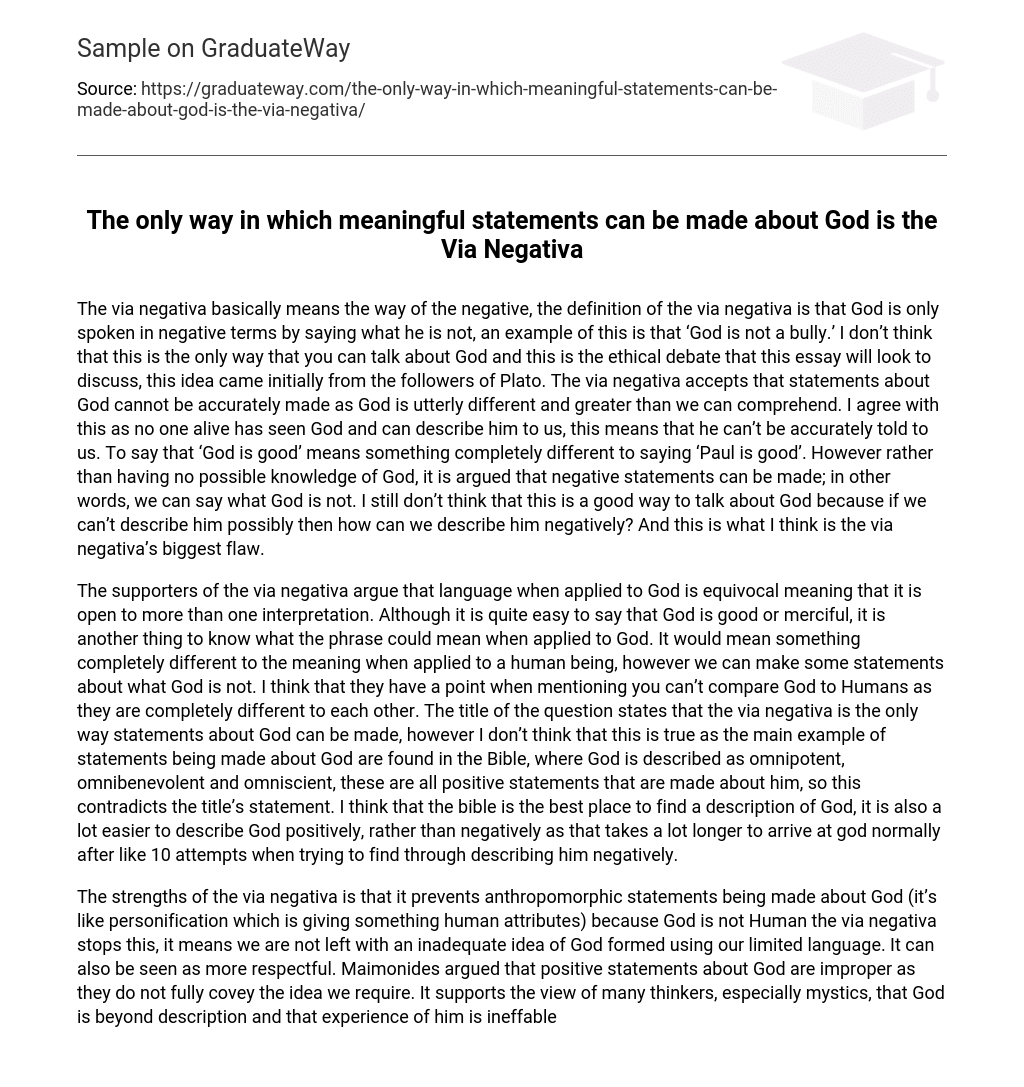The via negativa basically means the way of the negative, the definition of the via negativa is that God is only spoken in negative terms by saying what he is not, an example of this is that ‘God is not a bully.’ I don’t think that this is the only way that you can talk about God and this is the ethical debate that this essay will look to discuss, this idea came initially from the followers of Plato. The via negativa accepts that statements about God cannot be accurately made as God is utterly different and greater than we can comprehend. I agree with this as no one alive has seen God and can describe him to us, this means that he can’t be accurately told to us. To say that ‘God is good’ means something completely different to saying ‘Paul is good’. However rather than having no possible knowledge of God, it is argued that negative statements can be made; in other words, we can say what God is not. I still don’t think that this is a good way to talk about God because if we can’t describe him possibly then how can we describe him negatively? And this is what I think is the via negativa’s biggest flaw.
The supporters of the via negativa argue that language when applied to God is equivocal meaning that it is open to more than one interpretation. Although it is quite easy to say that God is good or merciful, it is another thing to know what the phrase could mean when applied to God. It would mean something completely different to the meaning when applied to a human being, however we can make some statements about what God is not. I think that they have a point when mentioning you can’t compare God to Humans as they are completely different to each other. The title of the question states that the via negativa is the only way statements about God can be made, however I don’t think that this is true as the main example of statements being made about God are found in the Bible, where God is described as omnipotent, omnibenevolent and omniscient, these are all positive statements that are made about him, so this contradicts the title’s statement. I think that the bible is the best place to find a description of God, it is also a lot easier to describe God positively, rather than negatively as that takes a lot longer to arrive at god normally after like 10 attempts when trying to find through describing him negatively.
The strengths of the via negativa is that it prevents anthropomorphic statements being made about God (it’s like personification which is giving something human attributes) because God is not Human the via negativa stops this, it means we are not left with an inadequate idea of God formed using our limited language. It can also be seen as more respectful. Maimonides argued that positive statements about God are improper as they do not fully covey the idea we require. It supports the view of many thinkers, especially mystics, that God is beyond description and that experience of him is ineffable that limit God from being made. Thus we do not speak of God in an improper way. Related to this it can be argued that only the via negativa adequately conveys the transcendence of God. There are a number of weaknesses as well; it could be argued that the result is a very limited understanding of God at best. The method doesn’t even work for everyday objects, let alone an all-powerful, transcendent of God. The via negativa is not a true reflection of how religious people speak of God. They don’t talk in the negative but rather seek positive knowledge of what God is.
The via negativa claims that no positive statement about god can be made. However if we are saying something negative, we are surely implying the positive statement as well. In conclusion the title of the essay is contradictory as the via negativa isn’t the only way that you can make a meaningful statement about God, the prime example being the bible, many people choose to describe God in a positive light no in a negative way such as the via negativa is. I think that the via negativa is quite a bad way to describe God as it’s a lot harder to get an answer from someone describing something negatively rather than positively. The via negativa has strengths and weaknesses like many other aspects of ethical language however I feel that the weaknesses seriously outweigh the strengths showing that the via negativa is a poor way to describe God.





